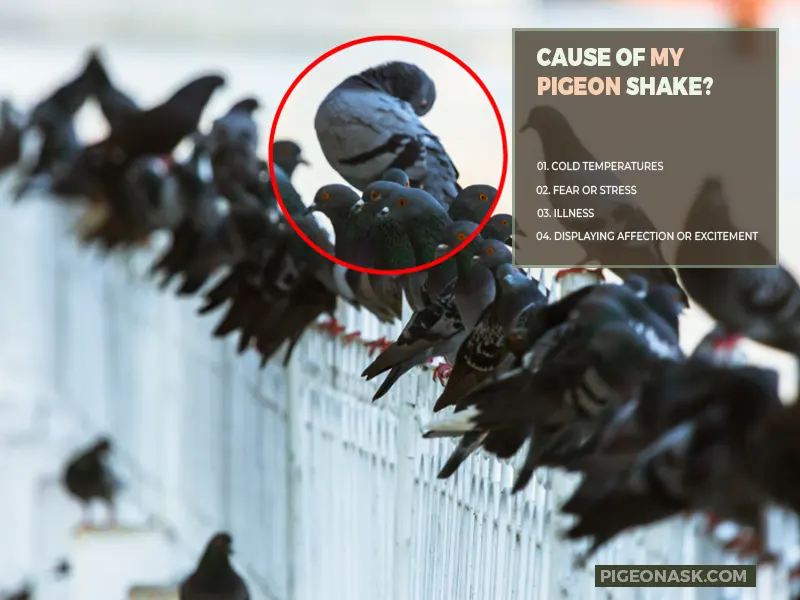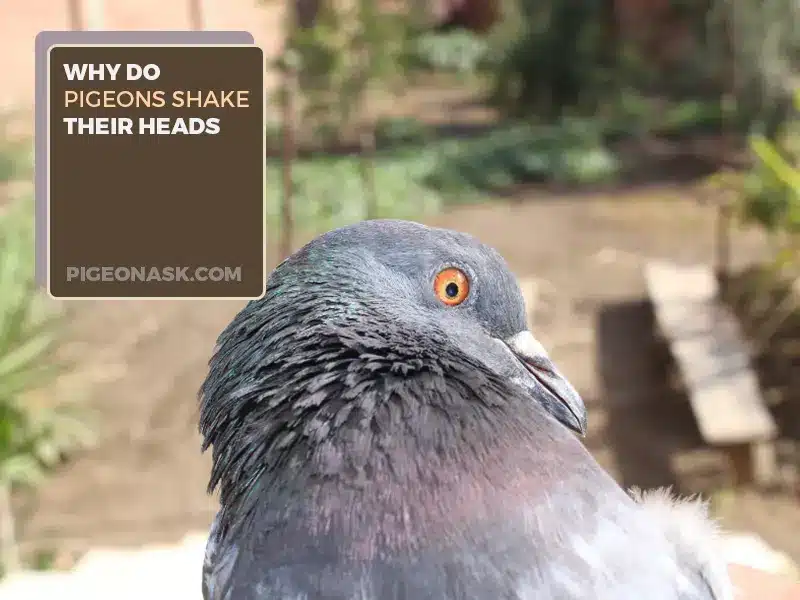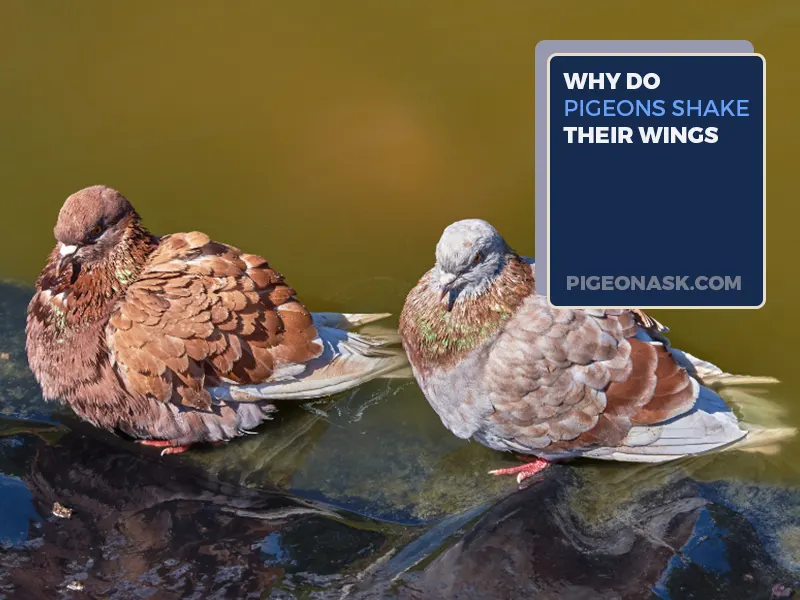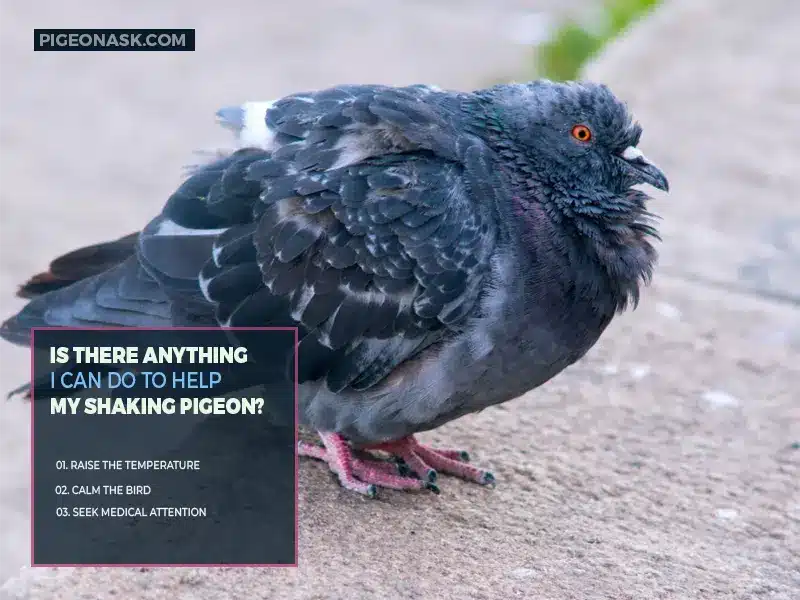Why Is My Pigeon Shaking?
You should be alert about behavioral changes if you keep pigeons as pets. Some sudden changes, such as frequent shaking, can be a sign of trouble.
And in such cases, it would be normal for you to ask, why is my pigeon shaking? Pigeons can shake for multiple reasons. Their bodies can vibrate excessively for being cold, sick, or too stressed out. Sometimes, shakiness can be a sign of affection or excitement.
So, how do you know what shakiness is for? Are there any signs that you need to look into? If you want to get to the bottom and learn everything about it, you need to continue reading.
Looking for more articles about pigeon habits:
What Could Be Causing My Pigeon to Shake?
As mentioned earlier, there can be multiple reasons why a pigeon might shake. Let’s discuss those factors in detail to deepen your understanding:

1. Cold Temperatures
The ideal temperature range for pigeons is 59 degrees to 72 degrees Fahrenheit, which is from 15 degrees to 22 degrees Celcius. If the environmental temperature goes below this range, the pigeons may start to shake.
2. Fear or Stress
Pigeons generally remain well aware of their surroundings. So, they can easily get stressed by loud noises, the presence of predators, or improper handling. And in such situations, the bird may start to shake.
3. Illness
Some illnesses, such as avian pox, avian influenza, and psittacosis, weaken the pigeons. And when they are too weak, they struggle to do their daily activities. As a result, these birds tend to shake when they are sick.
4. Displaying Affection or Excitement
Shakiness is not typically considered a sign of affection in animals and birds. But in some cases, the pigeons can get excited or be so pleased about something that they start to shake.
It is a rare case, though. So, consider the other signs before settling on this explanation.
Learn about pigeon lifestyle in “Pigeon Habits” . We cover their eating, nesting, and interactions with humans.
Why Do Pigeons Shake Their Heads?
Pigeons tend to bob their heads when they are walking around. It is normal behavior and a natural feature of these birds’ identity. Researchers believe that his head-bobbing allows the birds to balance themselves.

Some theories even explain that pigeons shake their heads while walking to sharpen their bird vision. Wondering how? It enables them permanently lock their vision on a single object, allowing the bird to not lose focus while moving.
That is, their eyes remain fixed on a particular object when the head bobbing compensates for any of the movements. Other than that, pigeons may shake their heads as a sign of disapproval. But there’s not much evidence for that theory.
Why Do Pigeons Shake Their Wings?
Pigeons can shake their wings to recover the ruffled feathers. In other words, shaking the wings is a method of preening themselves. This enables them to stay in good condition and makes the body feathers look good.

Other than that, pigeons can flap their wings to display happiness. These birds can also show such behavior to get the attention of their owners. But when they are alone, wing flapping or vigorous shaking can signify fear or stress.
Want to know how you can tell whether the shaking of the wings is a sign of fear or excitement? Generally, when pigeons rapidly twitch or shake their wings, they are excited about something. In other cases, it can be a sign of fear.
Why Do Pigeons Shake Their Feathers?
Pigeons can shake their feathers for various reasons. For example, when they detect split feathers, they will shake their feathers to make to recover. In addition, the shaking of feathers can be for cleaning or rearranging their wing feathers.
Moreover, pigeons shake their feathers to regulate body temperature. In this case, the birds will take advantage of air bubbles around them to lower their body temperature. Generally, pigeons adhere to such a move when it is too hot or cold.
Is There Anything I Can Do to Help My Shaking Pigeon?
Yes, you can help the pigeon when the bird is shaking. But you need to first understand the context. Let’s take a closer look to further understand:

Raise the Temperature
As discussed earlier, pigeons can shake when they feel cold. In that case, assess whether their nesting site has a relatively low temperature or not. If so, increase the temperature with a heater to comfort them.
Calm the Bird
Shaking can be a sign of stress. This can be hard to assess, but you can definitely try to comfort the bird by removing the bird from the nest. Hold the pigeon and try to calm the pigeon down.
On that note, if you are sure that the pigeon was shaking due to stress or fear, you should try to figure out the source. See whether there is a presence of predators around. If so, relocating the nesting site could help.
Seek Medical Attention
If you cannot determine what is causing the pigeon to shake, you need to contact a vet immediately.
Maybe, the pigeon is sick and is shaking due to feeling weak. You must get the root health issue identified and offer the correct medication in that case.
Final Words
Still asking yourself the question, why is my pigeon shaking? In short, pigeons can shake for feeling cold, sick, or stressed out. No matter the case, you need to assess the root cause and try to help the bird as soon as possible.
That brings us to the end of this article. Hopefully, you got all the answers you were looking for. If you did, could you please take the time and help us grow? You can support us by connecting with our Facebook, Twitter, and Pinterest accounts.
Article References:
- https://pubmed.ncbi.nlm.nih.gov/10600902/
- https://pigeonsarentreal.co.uk/why-do-pigeons-bob-their-heads-when-they-walk/
- https://www.snopes.com/articles/352787/why-do-pigeons-bob-their-heads/
- https://www.livescience.com/why-pigeons-bob-heads.html
- https://www.sciencedirect.com/science/article/pii/S0264127519308482
Images Credit:
- Canva.com/photos
